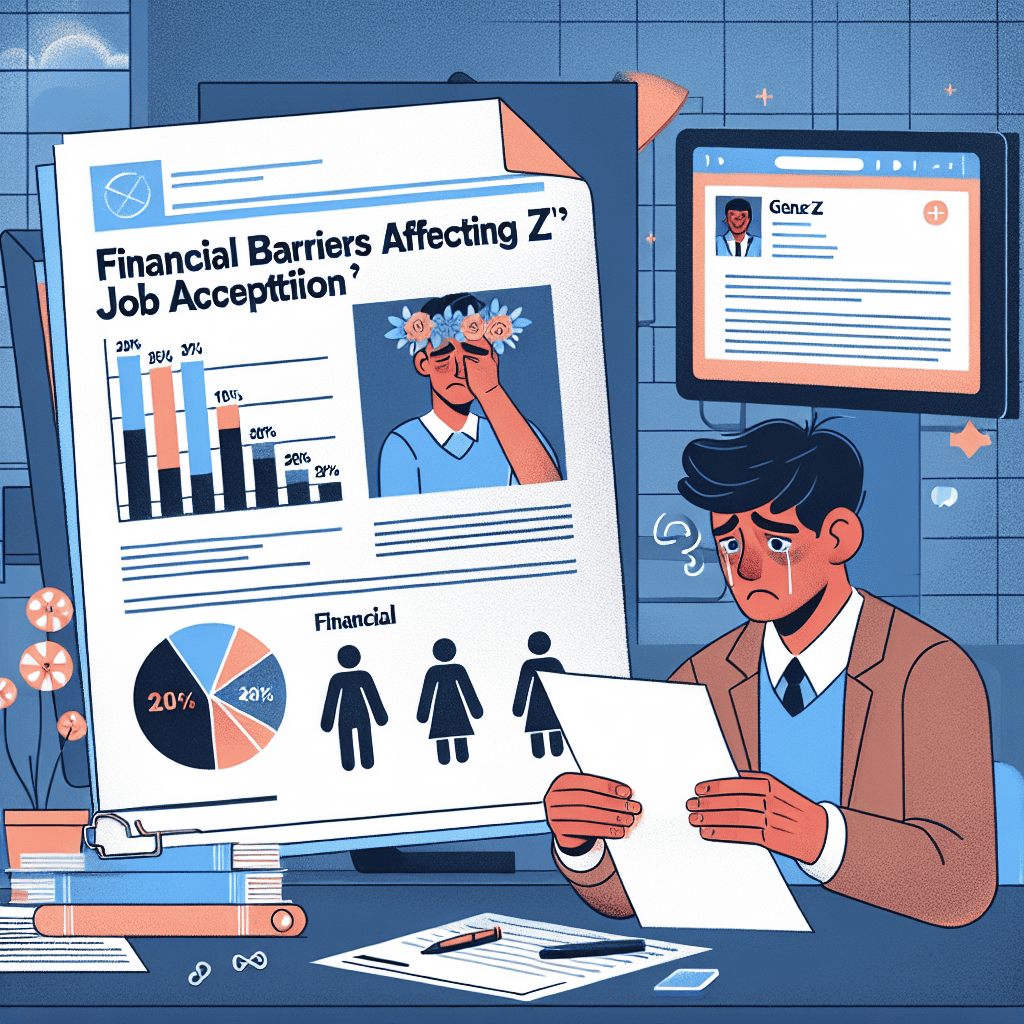“Gen Z: Turning Down Jobs, Not Dreams, as Financial Hurdles Rise”
Introduction
A recent report has highlighted a concerning trend among Generation Z, revealing that financial barriers are increasingly causing young job seekers to decline employment opportunities. As the newest entrants to the workforce, Gen Z faces unique economic challenges that are influencing their career decisions. Rising costs of living, student loan debt, and inadequate entry-level salaries are among the primary factors deterring them from accepting job offers. This phenomenon not only impacts the career trajectories of these young professionals but also poses significant implications for employers striving to attract and retain fresh talent. The report underscores the urgent need for companies to reassess their compensation packages and support systems to better accommodate the financial realities faced by this generation.
Impact Of Student Loan Debt On Gen Z’s Job Decisions
A recent report has shed light on a growing concern among Generation Z, revealing that financial barriers, particularly student loan debt, are significantly influencing their job decisions. As the newest entrants into the workforce, Gen Z individuals are increasingly finding themselves in a precarious financial situation, which is compelling them to decline job offers that do not align with their financial needs. This trend underscores the profound impact that student loan debt is having on the career trajectories of young professionals.
To begin with, the burden of student loan debt is a critical factor that cannot be overlooked. Many Gen Z graduates are entering the job market with substantial debt, which places immediate pressure on them to secure employment that offers not only a competitive salary but also benefits that can help alleviate their financial obligations. Consequently, job offers that do not meet these criteria are often declined, as they do not provide the financial stability required to manage their debt effectively. This situation is further exacerbated by the rising cost of living, which adds another layer of complexity to their financial decision-making process.
Moreover, the report highlights that Gen Z is more financially conscious than previous generations, largely due to witnessing the economic challenges faced by their predecessors. This heightened awareness has led them to prioritize financial security over other job attributes such as company culture or job satisfaction. As a result, they are more likely to turn down job offers that do not offer a clear path to financial independence. This shift in priorities is indicative of a broader trend where financial considerations are taking precedence over other factors traditionally associated with job satisfaction.
In addition to student loan debt, other financial barriers are also influencing Gen Z’s job decisions. For instance, the lack of affordable housing in many urban areas is a significant concern. Many young professionals are finding it difficult to accept job offers in cities where the cost of living is prohibitively high, even if the job itself is desirable. This has led to a situation where Gen Z is increasingly seeking remote work opportunities or positions in more affordable locations, thereby expanding their job search criteria beyond traditional geographic boundaries.
Furthermore, the report suggests that employers need to be more attuned to the financial realities faced by Gen Z. Companies that wish to attract and retain young talent must consider offering competitive compensation packages that address these financial concerns. This includes not only higher salaries but also benefits such as student loan repayment assistance, housing stipends, and comprehensive health insurance. By doing so, employers can better align their offerings with the needs of Gen Z, thereby increasing the likelihood of job acceptance.
In conclusion, the financial barriers faced by Gen Z, particularly student loan debt, are having a profound impact on their job decisions. As this generation navigates the complexities of entering the workforce, it is clear that financial considerations are at the forefront of their decision-making process. Employers who recognize and address these concerns will be better positioned to attract and retain Gen Z talent, ultimately benefiting both parties. As the landscape of work continues to evolve, understanding and adapting to the financial needs of the newest generation of workers will be crucial for long-term success.
The Role Of Housing Costs In Job Offer Rejections By Gen Z
A recent report has highlighted a growing trend among Generation Z, revealing that financial barriers, particularly housing costs, are increasingly leading this demographic to decline job offers. As the youngest cohort in the workforce, Gen Z faces unique challenges that differ from those encountered by previous generations. One of the most significant hurdles is the escalating cost of living, with housing expenses at the forefront. This issue is not only reshaping the job market but also influencing the career decisions of young professionals.
The report underscores that housing costs have become a critical factor in the decision-making process for Gen Z when considering job offers. Unlike previous generations, who might have prioritized job stability or career advancement, Gen Z is often forced to weigh the financial feasibility of accepting a position. This shift is largely due to the disproportionate rise in housing costs compared to wage growth. In many urban areas, where job opportunities are abundant, the cost of renting or purchasing a home has skyrocketed, making it difficult for young professionals to afford living independently.
Moreover, the financial burden of housing is compounded by other economic pressures that Gen Z faces. Many in this generation are entering the workforce with significant student loan debt, which further constrains their financial flexibility. As a result, even if a job offer appears attractive in terms of career prospects, the associated living expenses can render it untenable. This financial strain is prompting many young professionals to either negotiate for higher salaries or, in some cases, decline offers altogether if the compensation does not align with the cost of living in the area.
In addition to the direct impact of housing costs, there are also indirect effects that influence Gen Z’s employment decisions. The need to live in affordable areas often means longer commutes, which can detract from work-life balance and overall job satisfaction. Consequently, some Gen Z individuals are opting for remote work opportunities or positions in less expensive regions, even if it means sacrificing certain career benefits. This trend is indicative of a broader shift in priorities, where financial stability and quality of life are becoming paramount considerations.
Furthermore, the report suggests that employers need to be cognizant of these financial barriers and adapt their recruitment strategies accordingly. Offering competitive salaries that reflect the cost of living in specific areas is one approach. Additionally, providing relocation assistance or housing stipends could make job offers more appealing to Gen Z candidates. Employers might also consider flexible work arrangements, such as remote work options, which can alleviate the financial burden associated with commuting and housing.
In conclusion, the financial barriers posed by housing costs are significantly influencing the job offer decisions of Generation Z. As this generation continues to enter the workforce, it is crucial for employers to understand and address these challenges. By doing so, they can attract and retain top talent while also supporting the financial well-being of their employees. The evolving landscape of the job market necessitates a proactive approach to recruitment, one that acknowledges the unique financial realities faced by Gen Z. As housing costs continue to rise, this issue will likely remain a pivotal factor in shaping the career paths of young professionals.
How Transportation Expenses Influence Gen Z’s Employment Choices
A recent report has highlighted a growing concern among Generation Z, revealing that financial barriers, particularly transportation expenses, are significantly influencing their employment choices. As the youngest cohort in the workforce, Gen Z faces unique challenges that differ from those encountered by previous generations. The report underscores the critical role that transportation costs play in their decision-making process when considering job offers. This issue is becoming increasingly pertinent as the cost of living continues to rise, and young professionals are forced to navigate a complex economic landscape.
Transportation expenses, often underestimated, can constitute a substantial portion of an individual’s monthly budget. For Gen Z, who are typically in the early stages of their careers, these costs can be prohibitive. Many young workers are burdened with student loans and other financial obligations, making it difficult to allocate funds for commuting. Consequently, the financial strain of transportation can lead to the rejection of otherwise appealing job opportunities. This trend is particularly evident in urban areas, where the cost of public transportation or maintaining a vehicle can be exorbitant.
Moreover, the report indicates that the availability and accessibility of public transportation significantly impact Gen Z’s employment decisions. In regions where public transit is limited or unreliable, young workers may find themselves with few viable options for commuting. This lack of accessibility can deter them from accepting positions that require long or complicated commutes. In contrast, areas with robust public transportation networks tend to attract more Gen Z workers, as they offer a more affordable and convenient means of travel.
In addition to the direct costs of commuting, there are indirect financial implications that Gen Z must consider. For instance, the time spent commuting can affect work-life balance and overall job satisfaction. Long commutes can lead to increased stress and reduced productivity, which may ultimately influence a young worker’s decision to accept or decline a job offer. Furthermore, the environmental impact of commuting is becoming an increasingly important consideration for Gen Z, who are generally more environmentally conscious than previous generations. The desire to minimize their carbon footprint may lead them to prioritize job opportunities that offer remote work options or are located closer to home.
Employers, recognizing the importance of addressing these concerns, are beginning to adapt their strategies to attract and retain Gen Z talent. Some companies are offering transportation stipends or subsidies to alleviate the financial burden on young workers. Others are implementing flexible work arrangements, such as remote work or flexible hours, to reduce the need for daily commuting. These initiatives not only help to mitigate transportation-related financial barriers but also demonstrate a commitment to supporting the well-being of their employees.
In conclusion, transportation expenses are a significant factor influencing Gen Z’s employment choices. As this generation navigates the challenges of entering the workforce, it is crucial for employers to understand and address the financial barriers that may deter young professionals from accepting job offers. By offering solutions that reduce the financial strain of commuting, companies can better position themselves to attract and retain Gen Z talent. As the workforce continues to evolve, it is essential for both employers and policymakers to consider the impact of transportation costs on employment decisions and to develop strategies that support the needs of the next generation of workers.
The Effect Of Low Starting Salaries On Gen Z’s Career Paths

A recent report has highlighted a growing concern among Generation Z, as financial barriers increasingly compel them to decline job offers. This trend is particularly pronounced in the context of low starting salaries, which are proving to be a significant deterrent for young professionals entering the workforce. As the newest entrants into the job market, Gen Z faces unique challenges that are shaping their career paths in unprecedented ways. Understanding these challenges requires a closer examination of the economic landscape and the expectations of this generation.
To begin with, the financial pressures on Gen Z are multifaceted. Many members of this generation are graduating with substantial student loan debt, a burden that necessitates a stable and sufficient income to manage effectively. Consequently, low starting salaries are often insufficient to meet their financial obligations, leading to a reluctance to accept job offers that do not provide adequate compensation. This financial strain is compounded by the rising cost of living in many urban areas, where job opportunities are typically concentrated. As a result, the prospect of accepting a low-paying job becomes even less viable, forcing many young professionals to reconsider their options.
Moreover, Gen Z’s approach to career development is distinct from that of previous generations. They prioritize work-life balance, job satisfaction, and opportunities for growth over merely securing employment. This shift in priorities means that they are more discerning when evaluating job offers, often seeking positions that align with their values and long-term career goals. Low starting salaries, therefore, not only fail to meet their immediate financial needs but also fall short of their broader career aspirations. This misalignment between job offers and Gen Z’s expectations contributes to their hesitancy in accepting positions that do not offer a clear path for advancement or personal fulfillment.
In addition to these personal considerations, the broader economic environment plays a crucial role in shaping Gen Z’s career decisions. The job market has become increasingly competitive, with many entry-level positions requiring advanced skills and qualifications. Despite this, starting salaries have not kept pace with the rising demands placed on young professionals. This discrepancy creates a sense of disillusionment among Gen Z, who feel that their educational achievements and skills are undervalued. Consequently, they are more likely to hold out for job offers that they perceive as commensurate with their qualifications and potential.
Furthermore, the impact of low starting salaries extends beyond individual career choices, influencing the overall trajectory of Gen Z’s professional lives. By declining job offers that do not meet their financial and professional expectations, many young professionals delay their entry into the workforce. This delay can have long-term implications, such as slower career progression and reduced lifetime earnings. Additionally, it may lead to increased reliance on alternative forms of employment, such as gig work or freelance opportunities, which often lack the stability and benefits of traditional employment.
In conclusion, the financial barriers posed by low starting salaries are a significant factor in Gen Z’s career decision-making process. As they navigate the complexities of the modern job market, these young professionals are forced to weigh their immediate financial needs against their long-term career goals. The reluctance to accept inadequate job offers reflects a broader shift in priorities and expectations, underscoring the need for employers to adapt to the evolving demands of the workforce. Addressing these challenges will be crucial in ensuring that Gen Z can successfully transition into the professional world and contribute meaningfully to the economy.
Gen Z’s Struggle With Relocation Costs In Job Acceptance
A recent report has shed light on a growing concern among Generation Z, highlighting that financial barriers are increasingly causing this demographic to decline job offers. As the newest entrants into the workforce, Gen Z individuals are encountering significant challenges, particularly when it comes to the costs associated with relocating for employment opportunities. This issue is becoming a critical factor in their decision-making process, often leading them to turn down potentially lucrative positions.
The financial burden of relocation is multifaceted, encompassing not only the immediate expenses of moving but also the long-term financial commitments that come with settling into a new area. For many Gen Z job seekers, the prospect of covering moving costs, securing housing, and adjusting to a new cost of living can be daunting. These expenses can quickly add up, creating a substantial financial hurdle that many are unable or unwilling to overcome. Consequently, even when presented with attractive job offers, the financial implications of relocation can outweigh the perceived benefits.
Moreover, the current economic climate exacerbates these challenges. With rising housing costs in many urban centers, where job opportunities are often concentrated, the financial strain on young professionals is significant. The disparity between entry-level salaries and the cost of living in these areas further complicates the decision to relocate. As a result, Gen Z individuals are increasingly prioritizing financial stability over career advancement, opting to remain in their current locations where they can better manage their expenses.
In addition to the direct costs of relocation, there are also indirect financial considerations that Gen Z must weigh. For instance, the potential loss of a support network, which can provide both emotional and financial assistance, is a significant factor. Moving away from family and friends can lead to increased expenses, such as higher childcare costs or the need for professional services that were previously provided by a support network. These hidden costs can further deter Gen Z from accepting job offers that require relocation.
Furthermore, the rise of remote work has introduced new dynamics into the job market, offering Gen Z an alternative to traditional relocation. Many companies have embraced flexible work arrangements, allowing employees to work from anywhere. This shift has empowered Gen Z to seek out positions that do not necessitate a physical move, thereby avoiding the financial burdens associated with relocation. However, not all industries or roles offer remote work options, leaving some Gen Z job seekers with limited choices.
To address these challenges, some employers are beginning to offer relocation assistance packages as part of their recruitment strategies. These packages can help alleviate the financial burden of moving, making it more feasible for Gen Z candidates to accept job offers that require relocation. However, the availability and adequacy of such packages vary widely across industries and companies, and not all job seekers have access to these benefits.
In conclusion, the financial barriers associated with relocation are a significant factor influencing Gen Z’s job acceptance decisions. As this generation navigates the complexities of entering the workforce, the costs of moving and settling into new areas present formidable challenges. Employers and policymakers must recognize these obstacles and consider strategies to support Gen Z in overcoming them, ensuring that financial constraints do not hinder their career growth and opportunities.
The Burden Of Healthcare Costs On Gen Z’s Employment Decisions
A recent report has highlighted a growing concern among Generation Z, revealing that financial barriers, particularly healthcare costs, are significantly influencing their employment decisions. As the youngest cohort in the workforce, Gen Z is navigating a complex economic landscape, where the burden of healthcare expenses is becoming a pivotal factor in their career choices. This trend underscores the broader implications of healthcare affordability on employment patterns and raises questions about the sustainability of current employer-provided benefits.
To begin with, it is essential to understand the unique position of Gen Z in the labor market. Born between the late 1990s and early 2010s, this generation is entering the workforce during a time of economic uncertainty and rising living costs. Unlike previous generations, Gen Z faces the dual challenge of managing student debt and securing affordable healthcare. Consequently, these financial pressures are compelling many young professionals to decline job offers that do not provide adequate health benefits, even if these positions align with their career aspirations.
Moreover, the report indicates that the cost of healthcare is not just a financial burden but also a source of significant stress for Gen Z. With the increasing prevalence of gig economy jobs and freelance work, many young workers find themselves without access to employer-sponsored health insurance. This lack of coverage forces them to seek positions that offer comprehensive benefits, often at the expense of pursuing roles that match their skills and interests. As a result, the decision-making process for Gen Z is heavily influenced by the need to secure affordable healthcare, which can lead to a mismatch between their career goals and the opportunities they accept.
In addition to the direct impact on employment decisions, the financial strain of healthcare costs has broader implications for the economy. When young workers prioritize benefits over job satisfaction, it can lead to decreased productivity and higher turnover rates. Employers, therefore, face the challenge of attracting and retaining talent in a competitive market where benefits packages are as crucial as salary offerings. This dynamic necessitates a reevaluation of how companies structure their compensation packages to meet the evolving needs of the workforce.
Furthermore, the report suggests that policymakers and employers must collaborate to address these financial barriers. By exploring innovative solutions such as expanded access to affordable healthcare plans and increased transparency in benefits offerings, stakeholders can help alleviate the burden on Gen Z. Additionally, educational initiatives that equip young workers with the knowledge to navigate the complexities of healthcare options can empower them to make informed decisions about their employment.
In conclusion, the financial barriers posed by healthcare costs are a significant factor in Gen Z’s employment decisions, with far-reaching consequences for both individuals and the broader economy. As this generation continues to enter the workforce, it is imperative for employers and policymakers to recognize the importance of comprehensive benefits in attracting and retaining young talent. By addressing these challenges, there is an opportunity to create a more equitable and sustainable employment landscape that supports the aspirations and well-being of Gen Z.
Financial Literacy And Its Impact On Gen Z’s Job Market Participation
A recent report has shed light on a growing trend among Generation Z, revealing that financial barriers are increasingly causing this demographic to decline job offers. As the youngest cohort in the workforce, Gen Z faces unique challenges that are shaping their approach to employment. Understanding these financial hurdles is crucial to comprehending their impact on job market participation and the broader economic landscape.
To begin with, the financial literacy of Gen Z plays a pivotal role in their decision-making process. Unlike previous generations, Gen Z has grown up in an era of rapid technological advancement and economic uncertainty. This has influenced their financial outlook, making them more cautious and informed about their economic choices. However, despite their awareness, many still lack comprehensive financial education, which can lead to difficulties in evaluating job offers effectively. For instance, understanding the implications of salary packages, benefits, and long-term financial commitments can be daunting without adequate financial literacy.
Moreover, the rising cost of living in many urban areas exacerbates these challenges. Gen Z, often burdened with student loans and other financial obligations, finds it increasingly difficult to accept job offers that do not provide sufficient financial security. The cost of housing, transportation, and healthcare are significant considerations that can outweigh the appeal of a job offer. Consequently, many young professionals are forced to decline positions that do not meet their financial needs, even if these roles align with their career aspirations.
In addition to these factors, the gig economy has introduced both opportunities and challenges for Gen Z. On one hand, it offers flexibility and the potential for multiple income streams. On the other hand, it often lacks the stability and benefits associated with traditional employment. This dichotomy forces Gen Z to weigh the pros and cons of gig work versus conventional jobs, further complicating their employment decisions. The absence of benefits such as health insurance and retirement plans in gig roles can be a significant deterrent, especially for those who prioritize long-term financial security.
Furthermore, the COVID-19 pandemic has had a profound impact on the job market, altering the landscape in which Gen Z operates. The shift towards remote work and digital platforms has created new opportunities but also intensified competition for desirable positions. As companies adapt to this new normal, Gen Z must navigate an evolving job market that demands adaptability and resilience. However, the uncertainty brought about by the pandemic has heightened financial anxieties, prompting many to prioritize financial stability over other job attributes.
In light of these challenges, it is imperative for educational institutions and employers to address the financial literacy gap. By providing resources and training, they can empower Gen Z to make informed decisions about their careers. Employers, in particular, can play a crucial role by offering transparent compensation packages and flexible work arrangements that cater to the financial needs of young professionals. Additionally, mentorship programs can provide valuable guidance, helping Gen Z navigate the complexities of the job market.
In conclusion, financial barriers are a significant factor influencing Gen Z’s participation in the job market. As this generation continues to shape the future of work, addressing these challenges is essential for fostering a workforce that is both financially secure and professionally fulfilled. By enhancing financial literacy and adapting to the evolving needs of young professionals, society can ensure that Gen Z is well-equipped to thrive in an increasingly complex economic environment.
Q&A
1. **What are the main financial barriers causing Gen Z to decline job offers?**
– High cost of living, student loan debt, and inadequate salary offers.
2. **How does the cost of relocation impact Gen Z’s job decisions?**
– Relocation expenses can be prohibitive, making it difficult for Gen Z to accept jobs that require moving.
3. **What role does student loan debt play in job offer rejections?**
– Significant student loan debt pressures Gen Z to seek higher-paying jobs, leading to the rejection of offers that don’t meet financial needs.
4. **How do salary expectations of Gen Z compare to the offers they receive?**
– Gen Z often finds salary offers insufficient to cover living expenses and debt, leading to declined offers.
5. **What are some non-financial factors that influence Gen Z’s job acceptance?**
– Work-life balance, company culture, and career growth opportunities.
6. **How does the lack of remote work options affect Gen Z’s job decisions?**
– The absence of remote work flexibility can deter Gen Z from accepting positions, as they value work-life balance and flexibility.
7. **What strategies can employers use to attract Gen Z talent despite financial barriers?**
– Offering competitive salaries, student loan assistance, relocation support, and flexible work arrangements.
Conclusion
The report highlights that financial barriers are significantly impacting Generation Z’s ability to accept job offers. High costs associated with relocation, commuting, and inadequate entry-level salaries are primary factors deterring this demographic from accepting positions. Additionally, the burden of student loans and the rising cost of living exacerbate these challenges, making it difficult for Gen Z to commit to roles that do not offer sufficient financial incentives or support. As a result, employers may need to reassess their compensation packages and provide more comprehensive financial assistance to attract and retain young talent effectively.





